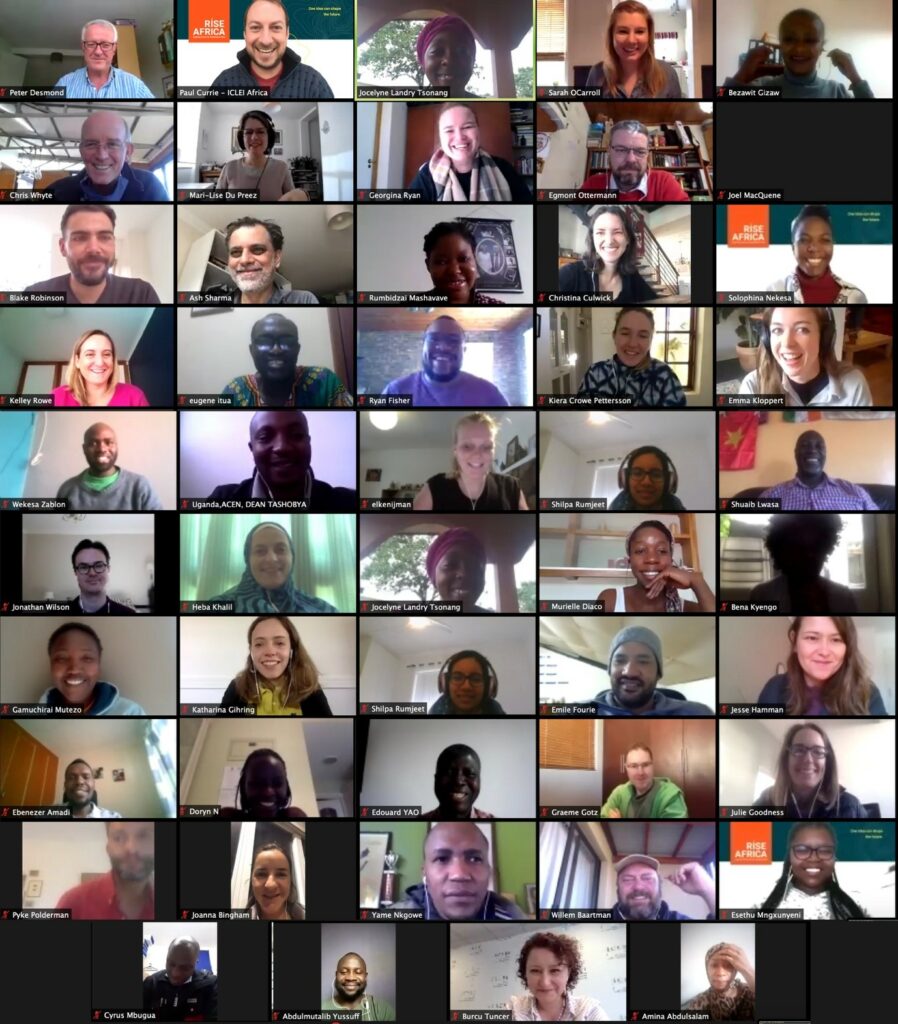20 August 2020
What does circularity mean in African cities: stakeholders gather online to find out
A community of practice on circular development is emerging in Africa. ICLEI Africa and partners are articulating what circularity can mean for our cities, with governance strategies that support informality, traditional knowledge and ecological regeneration as vital aspects of urbanisation.



Circular development asks us to reconfigure our society and economy in order to retain the highest value of products and services throughout their lifespans and reduce the socio-ecological impacts of overconsumption. In cities – the centres of consumption, industry and innovation – this means promoting regenerative local production, supporting redesign of value chain systems and effectively preventing and re-capturing wastes.
African thought-leaders conceptualise what circularity means on the continent
On 16 July 2020, ICLEI Africa and African Circular Economy Network (ACEN) convened 72 stakeholders working on circular economy, urban metabolism, resource efficiency and urban development in Africa to explore what circularity means in African Cities. We wanted to start a process led by African thought-leaders from different institutions and programmes to develop shared conceptualisations of circularity that resonate with, and can be applied, to our contexts.
This truly pan African meeting, with participants from 40 cities around Africa and the world, explored well-established strategies for circular economy – life-cycle design, virtualisation, substitution, regeneration, cascading, reuse, remanufacture and recycling – through the different systems lenses: food, water and sanitation, energy, industry, ecology and governance. Breakout rooms provided the chance for smaller, focused discussions and key insights relating to the need for multi-level governance to implement policies, using the Sustainable Development Goals as sign posts, strengthening urban resilience, prioritising skills development among youth and building on existing local knowledge.
This community of practice explored how informality and traditional knowledge, which form the backbone of many African cities, align with circularity principles, and how we can strengthen these aspects instead of losing them to ‘formalisation.’ While circular economy frameworks voice many social and technological approaches, robust policy guidance is still lacking. A key addition to these frameworks must be governance strategies and enabling environments for experimentation.

Future circular African cities could look like this
The group discussed how circularity could practically play out in African urban centres, many of which have emerging economies, and all of which will soon be navigating a post-COVID world.
New industrial parks could employ industrial symbiosis to engage traditionally separate industries in a collective approach in exchanging water, energy and material in one location. By articulating the social and cultural relationships that are intertwined with water, a city can better understand how citizens can participate in reshaping how water flows in and through a city, while responding to urban safety, gender equity and health risks. By investing in context-specific circular food initiatives, food can drive social and ecological wellbeing and improve community resilience and agency.
The energy and drive of this community of practice is strong and somewhat impatient to drive implementation of circular economy concepts. The group acknowledges that we have identified many circular economy opportunities in African cities, but that we need to collectively build evidence of successful cases. We must also find ways to effectively motivate decision makers and implementation agents to take these opportunities on board.
“In many respects, our cities are already utilising circular development strategies, hidden in different concepts, such as green economy, urban metabolism, resource efficiency, nexus, and more importantly, in informal strategies and societal traditions that support ecological regeneration, halt wastes and recognise climate change risks. Our aim is to propose African governance approaches to realising the circular economy, using strategies that already exist.”
Paul Currie
Manager , Urban Systems Unit , ICLEI Africa
ICLEI Africa and Ellen MacArthur Foundation lead discussions on food and circular economy
A webinar on 21 July in partnership with the Ellen MacArther Foundation and part of #AfricanCITYFOODMonth explored circular food systems and case studies of circular agro-food projects in South Africa, Sierra Leone, Tanzania and Uganda. Ellen MacArthur Foundation led the discussion on how we are already shaping more circular food systems in African cities, and what more we need to do. They also guided participants on a journey through principles of circular economy and case studies which reinforced the lessons.
Their analysis of food related impacts suggests that for every dollar spent on food, there is a dollar’s worth of impact related to consumption (obesity, hunger and micronutrient deficiency) and another dollar worth of impact related to production (economic, environmental and health). They propose we focus on the following:
- Source food grown regeneratively, and locally, where appropriate
- Make the most of food, through investing in by-products and the bio-economy
- Design and market healthier food products to influence consumer choice
New industrial parks could employ industrial symbiosis to engage traditionally separate industries in a collective approach in exchanging water, energy and material in one location. By articulating the social and cultural relationships that are intertwined with water, a city can better understand how citizens can participate in reshaping how water flows in and through a city, while responding to urban safety, gender equity and health risks. By investing in context-specific circular food initiatives, food can drive social and ecological wellbeing and improve community resilience and agency.
The energy and drive of this community of practice is strong and somewhat impatient to drive implementation of circular economy concepts. The group acknowledges that we have identified many circular economy opportunities in African cities, but that we need to collectively build evidence of successful cases. We must also find ways to effectively motivate decision makers and implementation agents to take these opportunities on board.
Where else to see ICLEI Africa’s circular development work
ICLEI Africa is running a number of initiatives to support engagement with, and uptake of, circularity principles among our partners and members.
On Paper
We are currently co-writing two impactful pieces to contribute the African perspective to international thinking on circularity.
- A Circular Economy Discussion Paper, with Ellen MacArthur Foundation, University of Lagos and Chatham House.
- A discussion piece on Circular African Cities with African Circular Economy Network, and many co-authors.
On Instagram
Our #hiddenflows photography competition “uses storytelling and photography to provoke thought and provide different perspectives on food processes in African cities,” explains Jehan Bhikoo (ICLEI Africa), who runs the initiative as part of the Inclusive Metabolism project, and part of the RISE Africa event. Further, it provides a basis with which decision-makers and citizens can engage to elicit discussion around sustainability in cities. Hidden Flows has two concurrent phases, an Instagram-based photo competition, and commissioned photographic portfolios. The initiative will culminate in an online exhibition in November, and an in-person exhibition at RISE Africa 2021.
In data
We are excited to be part of the CircleLab project which aims to extend the Circle City Scan Tool developed by Circle Economy to cities across Africa. Given the data scarcity in many of our cities, we expect to support the tool to embrace more qualitative ways of knowing or understanding resources in our cities. This process will support inclusion of more African cases, and explore how we can support circular development in our cities through quantitative and qualitative approaches. Further, it provides an opportunity for global cities to learn from African examples of circular economy.
On Instagram
ICLEI Africa is co-hosting two side-events at World Circular Economy Forum.
The nexus stream of the Local Climate Solutions for Africa (LoCS4Africa) virtual congress in November will further explore circularity concepts through the lens of climate finance.

